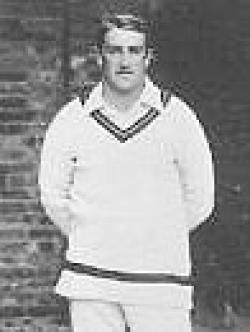
Published date
17 December 1881
George Aubrey Faulkner (1881 - 1930) was in his day a dominating figure in South African cricket, one of the games' finest all around players, and a legendary coach. His pupils included the likes of Ian Peebles and E.T KIllick. During the First World War he served with distinction with the R.F.A. in Salonika, Egypt and Palestine, gaining the D.S.O. in 1918 and the Order of the Nile.
Faulkner was one of earliest exponents of the now famous "googly," in which a bowler achieves an unorthodox spin, usually catching all but the more skilled batsman off guard, and often resulting in the taking of a wicket. However, unlike the typical bowler, Faulkner could send a googly at great speed, rendering it nearly un-hittable.
His career was full of remarkable performances. At Leeds in 1907 when, playing for South Africa in the second Test match of that series against England, he dismissed six men in the course of eleven overs for 17 runs. In that same season of 1907 he, in all matches for the South Africans, he scored 1,288 runs and took seventy-three wickets. Probably his two best series came against the MCC in 1909-10 and in Australia in 1910-11. In the five-Test series against the visiting MCC he totaled 545 runs at 60.55 and took 29 wickets at 21.89 - more runs than any other player on either side and second only to Ernie Vogler as top wicket-taker.
When the time came for him to retire from the game, Faulkner gained notoriety as a coach. He established the first cricket school known in London and by the time of his death the school had earned worldwide fame.
While all appeared rosy on the field, away from it Faulkner suffered his share of misfortune. His upbringing had been less than happy; the son of an alcoholic father, Faulkner was a lifelong teetotaler. Although Faulkner was outwardly happy and gregarious, as the years passed he became increasingly prone to bouts of depression, and on September 10th 1930 he gassed himself in a storeroom at his cricket school, leaving a poignant suicide note. He was 48. His young widow was left with an estate of under £300.
References
ESPN cricinfo,Holburn, G.(2001) "Aubrey Faulkner: professional success hid personal tragedy."From:ESPN cricinfo,[Online. 25 July . available at: www.espncricinfo.com ,[Accessed at: 26 November 2013]|
Find a grave,"George Aubrey Faulkner", From: Find a grave,[Online], available at: www.findagrave.com,[Accessed : 26 November 2013]